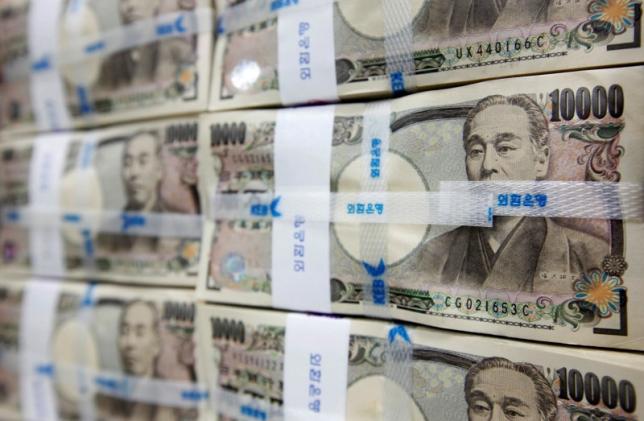
Tokyo: Asian stocks declined for a second day as the yen extended gains against the dollar, weighing on Japanese equities before a meeting of OPEC and a monthly U.S. jobs report. The MSCI Asia Pacific Index dropped 0.8 percent to 127.89 as of 4 p.m. in Hong Kong.
Japan’s Topix index lost 2.2 percent, the most in a month, after dropping 1.3 percent on Wednesday. The yen strengthened against the dollar for a third day after Prime Minister Shinzo Abe said he would postpone an increase in the nation’s sales tax and held back a widely expected fiscal stimulus package. "There’s now less chance of more Japanese monetary policy particularly when Abe said he’s thinking about doing more fiscal initiatives,” said Tony Farnham, a Sydney-based analyst at Patersons Securities Ltd.
"That should have the U.S. dollar on the back foot for a period of time. There’s certainly nothing in the Beige Book to say the Fed is cowering away from a rate increase.” In its Beige Book assessment of regional economic conditions, the Federal Reserve said the U.S. economy has expanded at a modest pace across most of the country since mid-April, causing the labor market to tighten as employers continued adding jobs and nudging wages higher.
The S&P 500 closed little changed as stronger American factory data contrasted evidence of sluggish global growth. Investors are looking to Friday’s American payrolls report as the Fed’s next policy review looms. Traders are putting the odds of an interest-rate hike by July at more than 50 percent. Investors are also watching developments out of OPEC’s gathering in Vienna and a European Central Bank interest-rate decision.
To follow Bloomberg’s live blog on the ECB’s rate decision, click here. Australia’s S&P/ASX 200 Index slipped 0.8 percent, led by financials, and New Zealand’s S&P/NZX 50 Index retreated 0.3 percent. South Korea’s Kospi index added 0.1 percent after figures were revised higher for the nation’s economic growth. After Japan removed one uncertainty looming over the stock market with the postponement of a sales tax, analysts still differ on whether the decision signals a turnaround for the nation’s shares.
Researchers at Mizuho Securities Co. and Okasan Securities Co. were among those saying that more progress is needed from the government’s stimulus efforts to boost equities. Others were more optimistic that the economic benefits from increased spending will benefit shares in the longer term. Honda Motor Co. tumbled 4.2 percent and Toyota Motor Corp. dropped 1.5 percent after their U.S. sales fell last month by more than analysts estimated. Yahoo Japan Corp. climbed 3 percent after the Nikkei newspaper reported SoftBank Group Corp. may boost its ownership of the search engine operator. Hong Kong’s Hang Seng Index added 0.5 percent and the Hang Seng China Enterprises Index rose 0.6 percent.
The Shanghai Composite Index advanced 0.4 percent as Chinese liquor maker Kweichow Moutai Co. climbed to a record high. Taiwan’s Taiex Index slipped 0.5 percent. Chinese investors are piling into Hong Kong equities at the fastest rate in more than a year as they seek shelter against a weakening currency and a worsening economic outlook. Mainland traders bought a net 21.9 billion yuan ($3.3 billion) of shares listed on the city’s stock exchange in May, the most since April 2015, according to data compiled by Bloomberg tracking investments via the exchange link with Shanghai. T
hat’s taken net inflows for the year to 46.7 billion yuan. India’s S&P BSE Sensex index lost 0.2 percent after changing direction at least eight times. Singapore’s Straits Times Index rose 0.2 percent and the FTSE Bursa Malaysia KLCI Index added 0.4 percent. Futures on the S&P 500 dropped 0.3 percent. The next major data point the Fed will consider comes Friday with the release of the government’s monthly payroll data for May.
The consensus among analysts is that the economy added fewer than 200,000 jobs for a second straight month. Fed officials meet June 14-15 to discuss policy, after Chair Janet Yellen said last week that a rate increase would be probably be "appropriate” in the coming months.